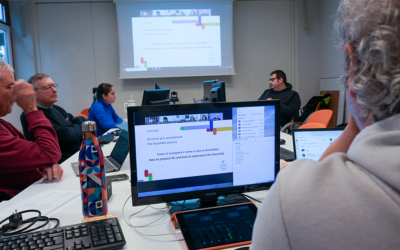The first General Assembly of the Focolare Movement without the foundress was held in July 2008. In fact, Chiara Lubich had died a few months earlier, on the 14th of March. An air of uncertainty hung over the already emotional and question-filled atmosphere as to who should succeed Chiara in leading the Movement. It seemed obvious to think of Chiara’s first companions, now elderly, but at least some of them were still capable of leading this first post-foundation phase.
During the first session of the Assembly, there was a talk from a legal perspective on a topic relevant to the Assembly given by Carlos Clariá, an Argentinian lawyer and general councillor, and Maria Voce, for many years secretary to the central delegate Gisella Cagliari. I remember that I was sitting next to the well-known theologian Piero Coda. When they concluded their talk, I told him rather boldly: “Here is our new president”. The truth was that the way she had explained things had impressed me greatly.
Maria Voce (Emmaus) was elected on the third ballot, not without a certain “suspense”. A new stage was beginning for the Work of Mary and I, too, was elected as a councillor.
One afternoon, after the elections, as we were leaving the Mariapolis Centre in Castelgandolfo, Emmaus approached me and said more or less these words: “I thought of entrusting you with the aspect of studies and culture in the new council. You are a man of thought, and I always liked the annual reports you wrote when you were responsible for a region in Latin America.” During the following six years, my relationship with her was very simple.
At the 2014 Assembly, Emmaus was re-elected, and the participants placed their trust in me as Co-President. Since then, our relationship has strengthened enormously, without losing its simplicity. I remember that in the beginning I felt a certain apprehension at the idea of having to work side by side with a president who belonged to the generation immediately following the first one, but this feeling was short-lived. I always perceived great respect and appreciation from her, which gave me a lot of freedom. I would arrive with a bunch of new ideas, and she would support me with her wisdom and experience. In our joint presentations we would prepare the essentials together and would complement each other in a simple way. I once told her, “As opposed to what you might think, I only feel confident in expressing some creative ideas when you are by my side.” We made long and important visits to India and China, where I witnessed her ability to penetrate the most intricate situations and relate to very different key personalities.
Maria Voce, Emmaus, will go down in the history of the Focolare Movement as the first president of the post-Chiara Lubich era. If we think that when she took up her role, many of Chiara’s first companions were still alive. We can understand the “spiritual resilience” with which she carried out her work in those early years; not because they were difficult people, but simply because they were the first ones, the arms of the foundress, people who in some way had been part of the founding charism.
Emmaus will go down in the history of the Focolare Movement for having been the president of the “new set-up”, the first innovative-organisational step of the Movement in the post-Chiara era, in creative faithfulness to the charism. In her first mandate, while Chiara’s absence was felt and could have caused discouragement, Emmaus travelled the world to strengthen the members and adherents of the Focolare communities in their commitment to a more fraternal and united world – in line with the charism of the foundress. In her second mandate, she began to prepare the Movement for the inevitable “crisis” phase appearing on the horizon, which Pope Francis identified as a great opportunity. And the Argentine Pope held her in great esteem. He pointed this out to her on every occasion. This demonstrates another of her characteristics: her ecclesial spirit.
I have always admired in Emmaus her simplicity, her inner freedom, her determination and her ability to discern, in which she was greatly aided by a legal background that she made her own.
Maria Voce will go down in the history of the Movement as “Emmaus”, to evoke the centrality of Jesus in the midst of his people. This was an absolutely non-negotiable principle for her.
Thank you, Emmaus, for saying a solemn “yes” at the most difficult time in our still short history. Mary will have taken you into her arms, presented you to her Son and together they will have carried you to the bosom of the Father who was the perennial source of your inspiration.
Jesús Morán
Co-President of the Focolare Movement
Photo @ CSC Audiovisivi




0 Comments